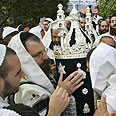
Hassidim run top camera store
The Hassidic-owned B&H photo-video shop in Manhattan is one of the world biggest, most famous camera stores. Baruch Hashem, business is good, owner says
Every morning except Saturday, the buses stop at a bustling corner of Manhattan, and bearded men in dark suits and felt hats, some clutching prayer books and speaking Yiddish, step onto the sidewalk and disappear into a brick building.
But this is not a yeshiva or synagogue.
This is B&H Photo-Video, one of the biggest and most famous camera stores in the world.
On any given day, 8,000 to 9,000 people pass through the front door a block from Madison Square Garden.
Known as "Beards and Hats'' because of the many Hassidic Jews who work there, B&H has become an authentic New York experience. Shopping there is akin to ordering a pastrami on rye at Katz's Delicatessen.
It is a loud and frenetic scene that involves fast-moving lines of customers, all pushing and elbowing to reach the cash registers. Above the bearded cashiers, conveyor belts move merchandise from one counter to the next.
"I live in Minnesota and the sensibility is not always Midwestern,'' said Alec Soth, a photographer with the legendary Magnum agency and a B&H customer for a decade. "it's a little more abrupt. But they're cheap and they have a huge selection.''
Even NASA shops here, Baruch Hashem
For many, the store has become indispensable. If you can't find it elsewhere, B&H probably has it. When NASA needed a rare lens years ago, it turned to B&H.
"They are the 800-pound gorilla in the photo specialty business,'' said Greg Scoblete, an editor at Twice, a trade publication that covers the consumer electronics industry.
But don't expect any miracles when you walk into B&H. Asked recently when the nano iPod would be in stock, a salesman laughed and said: "when the Messiah comes, and then he's going to want one.''
B&H executives refuse to discuss sales figures at the privately held company.
Ask how many cameras B&H sells every year and Herschel Jacobowitz, the company's chief information officer and business director, answers: "how many quarts of water are in the Hudson?''
Ask how business is going and you get this: "Baruch Hashem,'' or "Blessed be God'' - meaning, roughly, "thanks to God, things are good.'' (Store Manager Eli Daskal said he has always been told that the name B&H comes from "Baruch Hashem.'').
One indication of B&H's success that cannot be concealed sits in the Brooklyn Naval Yard: a nearly 200,000-square-foot warehouse that feeds its online division, which represents about 70 percent of B&H's business.
Modernity and tradition
B&H began in lower Manhattan in 1973. To some, the venture probably seemed like an unusual blend: Hasidism, a form of mystical ultra-Orthodox Judaism whose adherents look and dress like their 18th-century Eastern European ancestors, and the latest in electronics.
But the pairing made perfect sense, said Jonathan D. Sarna, a professor of American Jewish history at Brandeis University. In Europe before World War II, Orthodox Jews and Hasidim in particular worked as peddlers, and after the Holocaust, many came to the United States.
"It was a skill that they brought with them,'' Sarna said. "They knew about buying and selling. In the case of the Hasidim, many of them also came with these commercial skills and they looked around for a good product.''
Since moving to its current location in 1997, B&H has expanded rapidly, advertising aggressively on the radio. Already, B&H has outgrown its giant store. By April, B&H executives hope to double the retail space.
The company employs 800 to 900 people, many of them religious Jews. The store closes each Friday afternoon until Sunday in observance of the Sabbath, and on about a half-dozen Jewish holidays each year.
Richard Spiess, 34, a salesman at B&H for 2 years, said there are some advantages to being non-Jewish in such a heavily Jewish environment.
"We get a lot of nice holidays off,'' he said










